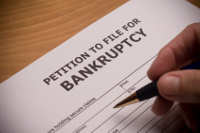Split happens: Why a joint credit card might not be a good idea
Published 8/29/11 (Modified 8/30/11)  By Jennifer Rose Hale
By Jennifer Rose Hale
"I can't get a credit card on my own. Will you help?"
Imagine this conversation with your boyfriend or girlfriend, child, or even a newly divorced parent. They're asking you to co-sign on a new credit card account, and you're tempted--or pressured--to help out. It might just be one more account for you, but it can make a big difference for their financial futures. What do you do?
Opening a joint credit card may seem like a good solution for a number of situations. But signing your name to joint accounts has risks. Understanding those risks can reduce the chance that you will pay for this decision, literally, in years to come.
Best case scenario
When you share a joint account with someone, you both are equally responsible for the card's balance. Every purchase made, every charge incurred: From the issuing bank's perspective, they're as much your purchases and charges as your fellow account holder's.
Read the full article » By Francine Huff
By Francine Huff  By Angela Spires
By Angela Spires  By Melissa Rudy
By Melissa Rudy  By Maryalene LaPonsie
By Maryalene LaPonsie  By Richard Barrington
By Richard Barrington